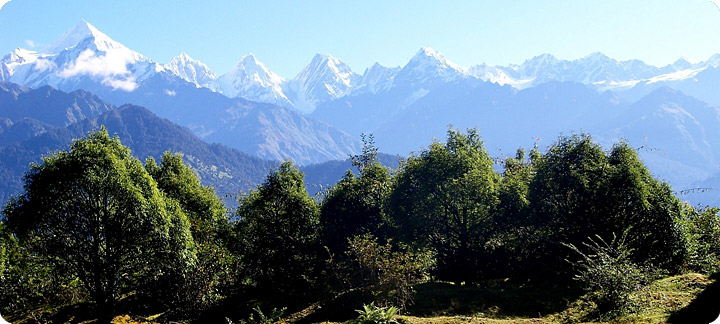‘A time comes in a person’s life, in a particular incarnation, when he begins to lose interest in the affairs of the world, knowingly or unknowingly. He may feel that he does not belong to the world, and the objects of the world no longer give him satisfaction. Though not clearly perceived, somehow he intuitively senses that the objects of sense gratification which he has sought over and over again, perhaps in several incarnations, have brought him nowhere. A faint idea begins to haunt his thoughts that he belongs to some other order of existence and that his home is somewhere else. This is the beginning of the search for that permanent element we now call “soul”.’ Ravindra Kumar
Somewhere in the Kumaon Hills, where gods circle mortals like vultures, a blue troupe of uniformed children accost me on their way home.
We are far from the klaxons and smells of Delhi, way north, climbing first by train, then Jeep, then foot, finally criss-crossing the Ganges, spiritual soldier ants in search of God knows what.
I had stood in my room shaking for weeks before boarding the plane. Don’t ask me why; the body has its own lexicon. But let me throw down some bones.
Sixty years earlier, when Gandhi was murdered, throwing the sub-continent into another tailspin, my family had packed their bags and headed – hastily – up The Suez Canal.
Although my mother and grandparents had been born there, little evidence of India made its way to the new world as I recall. My grandfather had broken ranks with his family to become a priest, missionary and – it was rumoured – tiger hunter.
Working with clients now for more than 20 years, I see the imprints of inter-generational shock and trauma, the legacy of diaspora, everywhere. And, of course, it found its way into me.
What happens to us is only one part of the piece; how it is handled, processed, another. There is a strong case for the importance of de-compressing, unfolding, allowing and spaciousness.
I was the first person in the family other than my young son (on a trip to Goa with his mother) to visit, as if the continent lay buried in the family vault, creaking with complexity.
So I shook with a desperate fear which left without notice as soon as I stepped foot on the plane. I felt carried by angels the whole trip, and wandered freely.
In Delhi, I went happily along with a nice little con (the money I passed on was nothing to me and everything to them, making the con itself something of a farce).
Like all egos, I was a seeker and my seeking had reached a kind of fever pitch. A number of years earlier, fate intervened with the arrival of new neighbours who were devotees of an Indian guru.
This wasn’t just any Indian guru, but the supreme avatar, Babaji. Those of you who have read Autobiography Of A Yogi will know that Babaji is said to appear at key times in history to lend a helping hand.
More than that, his last incarnation lived in the same small district as my family was from. If you prefer coincidence to synchronicity then perhaps move on.
I was 29, hungry but green, desperately frustrated by my life in newspapers and, although I probably wasn’t aware of it, a natural devotee.
As I joined in the rituals and seasonal celebrations, I was graced with the blissful experience of union I sought. I didn’t go to India for it, but I felt I had to go. It took me another 14 years to get there.
In looking at astrological charts for people these past ten years, I have learned many things. Whenever I see Venus conjunct Neptune in a chart, I know that person’s task is to find soul union.
When romantic love converges with spiritual love the seeker will not stop until he finds an ideal union, firstly with a lover and then – usually after repeated disappointments – within the Self.
The thirst is tangible, dissatisfaction with the world palpable. Many get lost in the physical world, in addictions. A gnawing sense of emptiness, meaningless, accompanies the seeker.
Those who don’t understand what they are seeing will often provide judgment and condemnation, instead of seeing the paradox: the closer we are to the light, the more the darkness comes for us.
Many are those who are bewildered as to why they are not interested in what the world offers, blaming themselves and struggling to find their place in the world.
The writer Eckhart Tolle calls them frequency holders and recognises that although the material world no longer values the contemplative man or woman, in times to come their currency will change.
As my consciousness re-aligned itself with my Indian heritage, in the final throes of my twenties, I went with a group of Babaji devotees to Battersea to see the hugging saint, Amma.
At around the same time, I would escape the drudgery of work on the evening paper in Gloucester, to steal a few pages of Andrew Harvey’s book Hidden Journey in the book shop over lunch.
Harvey is both scholar and mystic, his tome on his time in India compelling, quenching, and satisfying.
In Battersea, I attended a lunch party for devotees, desperately self-conscious and shy. A small Indian woman answered the door and we filed in. She stopped me by raising a hand. ‘Here we have a very old soul,’ she said.
It was hard to tell if it was my heart or my ego that leapt, but it was clear I would get to India.
And so, in the mountains, I found myself walking a dusty track with a companion in search of the fabled Jesus Tree.
It was here, the story goes, that Jesus sat and was taught by the great avatar, during his missing years when it is widely said, he walked The Silk Road, studying with the masters of his day.
I had been given the money for the trip by my then lover, although our separation caused us both considerable angst and I found myself sitting astride the thorny fence that can separate romantic and spiritual love.
I was in the ashram for the spring Navaratri festival and vacillated wildly as my heart both opened and closed. This was a place of huge intensity, strong emotion, no more so than in festival season when numbers swell.
At the height of proceedings, making an offering of food in a long line to the resident guru, Muniraj, Babaji’s successor, I managed to drop some grapes in his lap. He looked at me fiercely: ‘What do you want?’
‘I don’t know,’ was all I could manage and we stared at one another wildly. It was a stare that lasted the whole trip and I could not wait to get out and back on the road.
When the day came, a small band of us were driven back to the village where we would meet taxis at the local pharmacy. Just as I thought I had been delivered from my embarrassment, Muniraj, who doubled as the local pharmacist, appeared with his ever-present cohort of black-clad Italian devotees.
It was a small shop with only two chairs. I was on one; he placed himself on the other and resumed his stare. Again, we were locked in together.
‘Leaving?’ he asked.
It was a question working at many levels. He knew it and so did I.
‘Yes,’ I affirmed, knowing that what I was doing was both wrong and perfect.
My solo taxi ride took all day and although heading for Rishikesh, had no plan, surrendered to fate and found myself on a yoga retreat a mile or so out of town.
The river, the one I would bathe in at 4am each day, seemed to have followed me and I would sit on its banks watching white-water rafters as we practised pranayama (breathing exercises) – a small group of westerners watching their bellies move in and out.
The country’s premier practitioners could be seen daily on television sucking in their stomachs, promoting good health and spirituality as if it was diet coke.
The bizarre and sublime nature of India was astonishing and yet I knew that like many people, nothing in this world would satisfy me.
Often people castigate themselves as selfish or ungrateful at such a point in their evolution, without any cultural reference for their experience it is easy to think in such terms, but that is most often an error.
What is being presented is a doorway, one that is a threshold that leads out of a world of a reflected light into one much purer that lies within.
Sometimes, we need the grace of suffering to enter it. Once there, we have to face the repressed pain that acts like a Biblical angel with flaming sword, barring the gates to Paradise.
In Sufism, this turning point of the soul is called tauba, and marks the start of our return journey to a place we cannot remember yet once called home.
© simon heathcote




